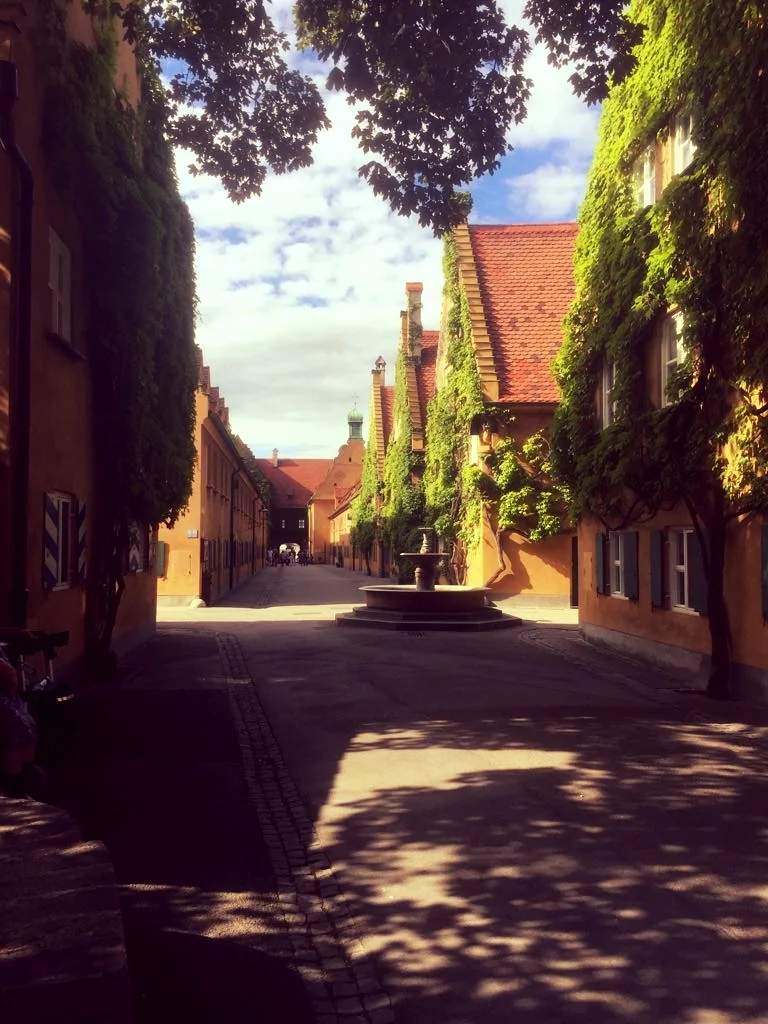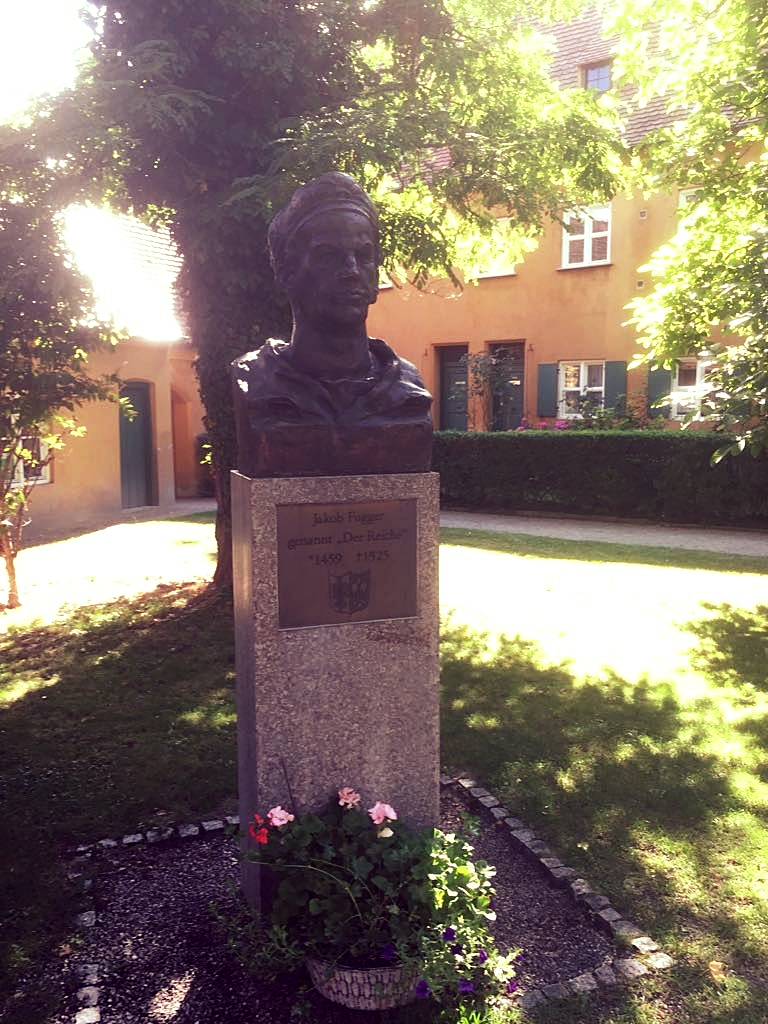What The Fugger Is Going On With Social Housing?
In the Southern German state of Bavaria, nestled between the Lech and Wertach rivers sits the state's third largest city, Augsburg. Although not well known outside of Germany, Augsburg has been the backdrop to many famous events throughout history and was the setting for some central events of the reformation. It is the birthplace of Leopold Mozart, the father of Wolfgang Amadeus Mozart, as well as one of Germany’s most famous playwrights, Bertolt Brecht and in addition the city was a leading exponent of Rococo art. Nowadays, it is perhaps more well known as a university city, with hundreds of students swelling the city’s population and filling its numerous cafes and restaurants with intelligent conversation, hemp tote bags and unkempt facial hair.
It is a beautiful city of open squares and amazing architecture, but one of my favourite aspects is the small winding side streets that sprout from the central Maximilianstraße. It is here that the best clubs and bars can be found, as well as the small canal that seems to appear from under buildings at various points throughout the Altstadt. It is among the small cafes, boutiques and bars, just around the corner from the Rathaus that one of the most interesting aspects of the city and Germany as whole can be found, the Fuggerei.
Rathausplatz, Augsburg
The Fuggerei is a village within the city, a gated community where it feels like little has changed in hundreds of years. It houses a small 16th century church, for the use of its residents as well as 52 beautiful, but small houses that date from earlier in the same century. To modern eyes, this protected community and the land it sits upon is worth millions of Euros, which is what makes the village so interesting. The church, the buildings and even the fountain are not the only aspects that have not changed over the centuries, the rent for one of these houses has remained the same since 1516.
The Fuggerei is the first attempt at social housing in the world, conceived and paid for by Jakob Fugger the Younger in 1516. The Fuggers dominate Augsburg and the local area, with numerous streets named in honour of the many family members. The street where the Fuggerei stands is named for its founder, Jakobstraße, but go out into the villages and towns of the area and the Fugger name can be seen emblazoned on city signs that proudly connect themselves to this illustrious family. From Fuggerhaus to Fuggerstadt, the family name lives on.
The Fuggers began as a family of weavers, but quickly became merchants, mine owners and finally bankers. They tied themselves inextricably to the imperial Habsburg family and the papacy, lending money for the election of Habsburg Emperors and papal projects during the early modern period. So wealthy had the family become by the 16th century, that by the time of Jakob Fugger’s death in 1525 he was known by the epithet “The Rich”.
It was perhaps Jakob’s accumulation of earthly wealth or a desire to give back to the city that had helped him to rise to such financial heights that he founded the Fuggerei in the centre of the city. Purchasing a large piece of land, he had his architects construct homes for the poorer citizens of the city. The rent was to be set at one Rheinischer Gulden per year, with residents also promising to say the Lord's Prayer, Hail Mary, and the Nicene Creed three times a day. In addition, residents must have lived in the city for two years, be of the catholic faith and have fallen into poverty.
Jakob Fugger "The Rich"
Today, many of these rules still apply. The rent remains at one Rheinischer Gulden (€0.88) plus water and electricity usage, although applicants are assessed by the resident's committee before being welcomed into the community. There are 150 current residents living in the 45 to 65 square meter apartments and although it is still social housing, it is also an active museum with many visitors taking tours throughout the day. The price of admission, €4.00, is equivalent to four times the rent of one of the Fuggerei properties.
The example of the Fuggerei and its attempts at providing the poor of Augsburg with affordable accommodation is admirable, especially when we consider the recent long-term trend of decreasing social and affordable housing throughout Europe. The UK, especially since the horrific fire at Grenfell tower, has been occupied with the issue of affordable homes for those on the lowest of incomes. British cities have seen an exodus of low income families and individuals, priced out by the continual rise in rents and house prices throughout the country.
The decrease in social housing is one that concerns Germany too and the growth of affordable homes is considered an important government policy objective. Despite it being a goal, Germany’s stocks of affordable and social housing has been dropping year on year. Die Linke, the German left wing party, has claimed that 150,000 new homes are required per year to catch up to previous levels.
Then again, it is hard to ascertain exactly how much of a problem there really is in Germany, due to social and affordable housing policy being devolved to the federal state legislature since 2006. Another problem that confuses the situation is that, unlike the UK which set up non-profit organisations to administer to public housing, Germany has opened the doors to private and for profit groups to build more housing. In return, these companies and groups can receive tax credits or favourable loan conditions to incentivise new projects. This means that the conditions of affordable and social housing differs from state to state and groups such as The Organisation for Economic Co-operation and Development (OECD) find it hard to get a clear picture of investment within each German state. With this in mind the OECD has produced figures for 2015 that show only 3.9% of housing in Germany can be considered social housing, which lags far behind the UK’s figure of 17.6%.
OECD Social Housing stock % by country
This is not to say Britain has in any way succeeded with regards to social housing, if any conclusion can be drawn at this point from the tragedy of Grenfell Tower, it is that the UK needs more social and affordable housing as the gap between rich and poor continues to grow. Germany is not a poor country, but a lack of central control and a willingness to ignore how states manage the problem of housing is only exacerbating the issue. The history of Germany has shown an ability to provide homes for the lowest income groups, from the Fuggerei to the post war public housing initiatives that concluded in the last decade of the 20th century. Germany did it once and now it is time that they did it again.











